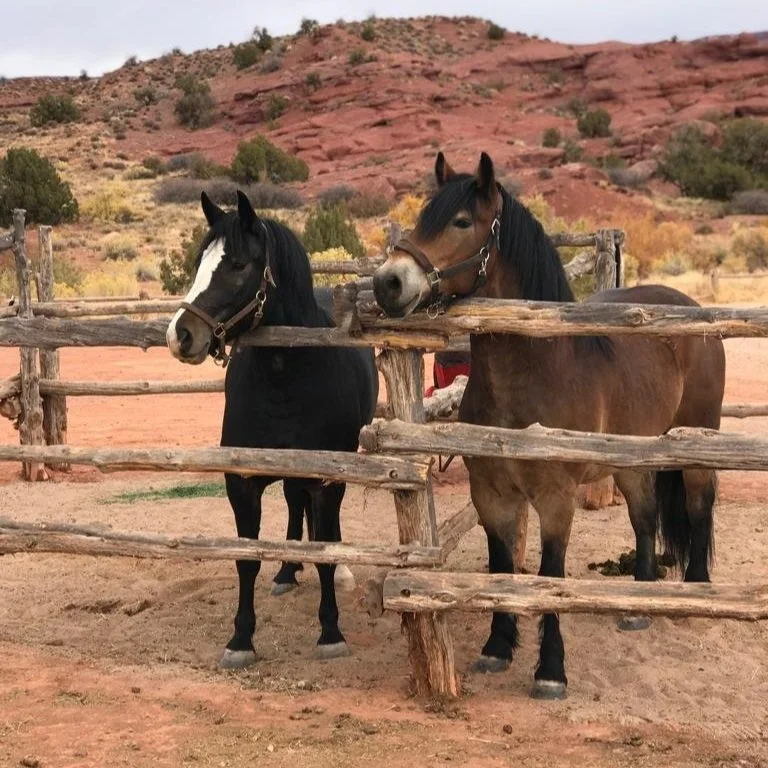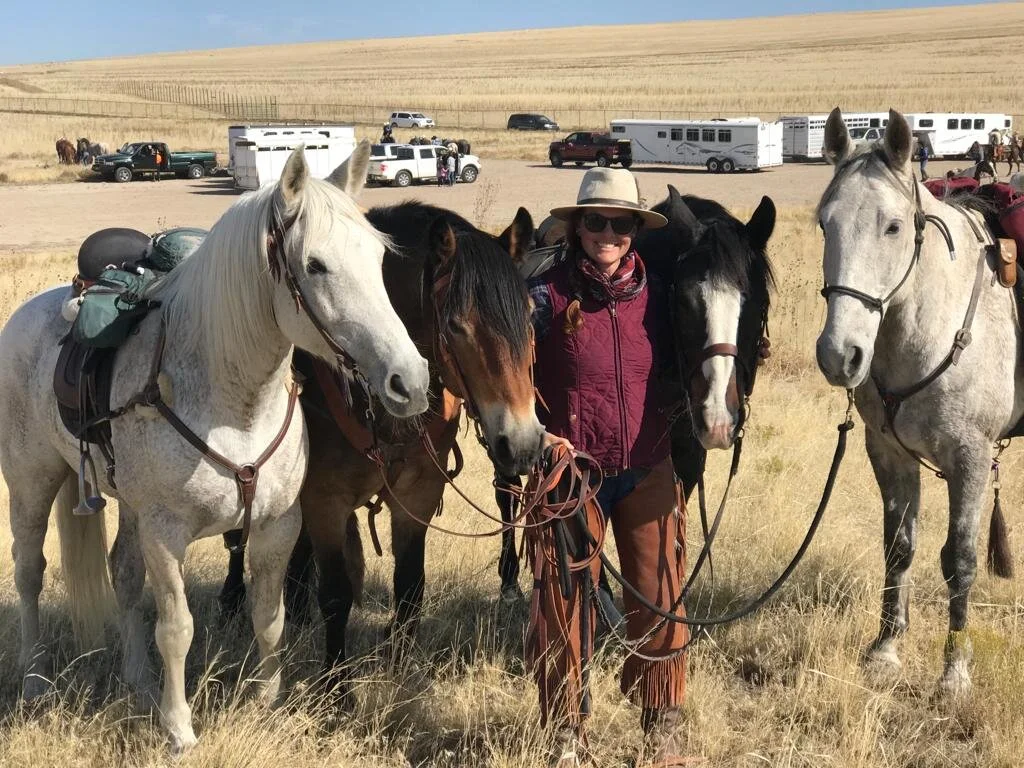Viewing entries in
Rider Resources
These books about horses, riding, and adventure are the true stories of some remarkable horsewomen from across the ages.
What to expect and how to prepare for your first foxhunting experience with your horse. Whether joining a live or a drag hunt, there are factors to consider such as tack and turnout, fitness and conditioning, and training which can be helpful before you find yourself in the hunt field.
Bringing your own horse on a trip is a unique and exciting way to travel, discover new places with your equine partner, and create new experiences for both horse and rider. Read through these Guidelines to understand what is expected of both horse and rider on a trip, and to ensure your horse meets the guest horse requirements.
How do you decide what kind of horse holiday or riding trip is right for you? Experience is an important factor to consider in order to ensure a safe and enjoyable equestrian travel experience, and our descriptions of riding level classifications will help steer you in the right direction.
Guide to Foxhunting Vocabulary and Terminology
When I describe the red coats, the sound of the hunting horn, exhilarating gallops, and howling hounds, folks tend to look at me like I’ve joined a cult. And honestly, from the dress code to the unique and peculiar traditions, it could be a cult, except that our religion is the rush of the ride and the thrill of the chase, our huntsman is our priest, and whether we ride through enchanting forests or wide-open prairie, those hours in the saddle each week are our church.
When I describe the red coats, the sound of the hunting horn, exhilarating gallops, and howling hounds, folks tend to look at me like I’ve joined a cult. And honestly, from the dress code to the unique and peculiar traditions, it could be a cult, except that our religion is the rush of the ride and the thrill of the chase, our huntsman is our priest, and whether we ride through enchanting forests or wide-open prairie, those hours in the saddle each week are our church.
It’s August in Colorado, and most summers that means there’s a haze on the horizon to the west, the late afternoon sun burns blood red, and the acrid smell of distant smoke blows on the summer breeze. Even when the fires are far away, the effects are acutely felt. Imagine how your horse feels.
We all hope never to have to deal with an equine emergency at all, let alone away from home, the barn, and the vet. But if or when it does happen, best be prepared. Having an equine first aid kit and the knowledge to handle emergencies, from minor injuries to serious wounds, can make all the difference for your horse in an emergency situation.
While it’s important to have an extensive kit at home, or in the barn, keeping one in the trailer is just as important - emergencies are just as likely, if not more so, when away from the secure and comfortable environment your horse is used to. Knowing where to find everything is helpful when time is of the essence, and it’s equally important to know how to use the products in your kit, but that’s a post for another day.
Here are some of the most essential items for your equine first aid kit, both in your home/barn/trailer, and in a compact version you can take with you on the trail.
As an Amazon Associate, Equescapes may earn an affiliate commission when you buy through links on our site, but you do not pay any more than the regular price for this service, and we personally stand by the products we recommend.
Equine First Aid Kit Essentials - at home, in the barn, and in the trailer
Since saving space is not crucial here, this kit can be more robust, containing a wider variety of materials, medications, tools, and supplies.
Tools
Stethoscope
Thermometer (and Vaseline for insertion)
Flashlight or headlamp (with working batteries)
Scissors
Tweezers
Wire snips
Latex surgical gloves
Syringes - varying sizes (60cc dose with catheter tip for oral medications, 10cc dose with hypodermic needle for injections)
Cold pack
Tongue depressors - an easy way to apply ointment
Twitch
Clean towel
Clean bucket
Rubbing alcohol - for disinfecting tools and injection sites
Saline solution - for flushing hard-to-reach places, such as eyes
Bandaging Materials
Having different shapes and sizes of bandaging material will be helpful in accommodating different wounds and different horses.
Cleaning solution - Betadine, Iodine, or Chlorohexadine solution
Hydrogen Peroxide for cleaning wounds
Non-adhesive bandages - Telfa pads
Gauze and/or cotton padding to keep bandages in place
Vet wrap to apply pressure and hold bandages in place
Elastikon or tape to keep smaller bandages in place
Pillow wraps and standing wraps for horses confined to a stall
Diapers - for padding a wrapped hoof
Medication
It’s important to pay attention to expiration dates on your medication, and keep everything current. Better to have it and not use it, than to need it and have it be expired and less effective. Exposure to extreme temperatures can also shorten the shelf life of some medications.
Anti-inflammatory medication - Phenylbutazone (Bute) or Banamine - Bute is available as a tablet or paste, in pre-measured doses to be given orally. Banamine is available as a paste or liquid for IV injection, but do not give an injection unless you know how to do so safely and correctly.
Sedative medication - Acepromazine (Ace) (IM or IV) or Dermosedan (oral)
Topical antibiotic medication - Neosporin or Triple Antibiotic cream
Antiseptic wound cream, powder, or spray
Electrolyte paste for dehydration
Equine First Aid Kit Essentials - on the trail
Emergencies and injuries can occur even on short trail rides, close to home, but you definitely don’t want to be caught in an emergency situation far away from the barn or trailer. Limited weight and conservation of space are an important consideration for your saddle bag kit, so this kit will contain more bare essentials, or smaller versions of the same supplies.
Where are you riding? Some supplies will be dependent on the region. For example, rattlesnake bites and supplies to treat them are a factor to consider when riding in the southwest, but less so in, say, Alaska.
Designate a kit or saddle bag for first aid. This way, all your first aid equipment is in one place and easy to find, rather than packed in throughout multiple saddle bags.
Some items are useful for people, too. Antibiotic ointment, bandages, etc. that are also crucial elements to a human first aid kit do not need to be in both. Save spaces by eliminating double items.
Multipurpose tool - knife, scissors, wire cutters, file, tweezers, etc. can come in handy for all sorts of things
Hoof pick
Emergency blanket - small compact blanket can be used to keep you warm if stranded, or as a sterile work surface to lay tools out on
Flashlight
Wet wipes
Latex gloves
Benadryl
Betadine
Sunscreen
Duct tape and bailing twine - you never know. Keep a horse or human's bandage in place, tape on a loose shoe, or pack a hoof to get a horse back to the trailer, repair tack, reattach a rein, make a lead rope, etc.
Vet Wrap
Hoof boots - even if you don’t use them regularly, they can be helpful in case of a thrown shoe
Freezer bags - can serve as buckets to water horses or soak hooves, pack out trash and waste
Tongue Depressors
A horse doesn’t have to be running to be a runaway – whether a horse became separated from its rider or wandered away from an overnight camp, a loose horse in the wilderness can be a scary situation for both horse and rider.
Camping with your horse is a great way to combine a love for riding with a passion for the outdoors, wide-open landscapes, and wild places. Taking your horse camping can be a lot of work, but it’s worth the effort. Here are some tips to get you started.
These movies about horses, riding, travel, and adventure fueled my childhood love of horses and they are some of my favorites to this day. What horse movie has moved or inspired you?
“Camping” can mean a lot of different things to different people, from bare-bones-backpacking to luxury glamping. Camping with horses covers a similarly wide range of activities, but at its core, it’s about enjoying horses, riding, nature, and the wilderness. Whether you’re a seasoned outdoors(wo)man looking for a truly immersive wilderness experience on horseback, or you’ve never camped before, with or without horses, camping is an exciting and unique way to experience horses and the outdoors at many different levels.
These books about horses, riding, and travel are a few of my personal favorites. Happy reading!
Packing can be daunting, and sometimes when you don’t know what you need it can be tempting to bring EVERYTHING, just in case. But when you’re traveling with pack horses, it’s important to pack light! Here are some essentials to pack for the trail…
Packing can be daunting, and sometimes when you don’t know what you need it can be tempting to bring EVERYTHING, just in case. Here are some essentials for foxhunting trips anywhere in the world...
How to Walk the Walk, Talk the Talk, and Dress the Part for a Proper Foxhunt
Foxhunting is deeply rooted in tradition, and many traditions which originated on the hunt field are still carried out today in other riding disciplines, like plaiting manes or wearing a stock tie for dressage. If it’s your first time foxhunting, it’s important to dress the part. While some of these items vary for different hunts, this list is applicable to most.
Formal Foxhunting Attire
Helmet or Riding Hat: Although you might see some riders wearing top hats or hunt caps without a chinstrap, an ASTM-approved helmet is generally recommended anytime you’re riding, especially if you’re jumping. For formal hunts, your helmet should be black velvet, with the bows in back pointing up (unless you’re a member of the staff). Long hair should be pinned up in a bun or tucked into your helmet with a hairnet. Top hats should only be worn with coats with tails.
Coat: Black, lightweight for warm weather or wool frock for winter. Some hunts specify navy, hunter green, or other colored coats for the members and/or masters, but black is usually a safe choice. Three buttons in front, two buttons on each cuff. Never wear a red coat unless you have earned it and are supposed to!
Shirt: White, long-sleeved (like a show shirt), tucked in.
Stock tie: A plain white stock tie should be fastened with a plain, gold pin. Some hunts specify a different type of pin, but a plain, straight, gold pin is a classic safe choice.
Vest: A canary yellow or a tattersall vest is acceptable for most hunts.
Breeches: Tan, buff, or canary breeches. For some hunts, masters and red coats will wear white breeches.
Boots: Black leather dress boots are traditional, although many riders wear field boots (with laces).
Belt: Belt should be black and shirt should be tucked in. Leather belts are advised, as they can be substituted as a rein or stirrup leather if needed.
Gloves: Gloves may be black or white, depending on the hunt.
Informal Foxhunting Attire (Ratcatcher)
Helmet or Riding Hat: An ASTM-approved helmet is generally recommended anytime you’re riding, especially if you’re jumping. For informal hunts, your helmet can be black or brown. Long hair should be pinned up in a bun or tucked into your helmet with a hairnet.
Coat: Tweed (in many patterns) and muted earth tone coats are acceptable for informal hunts and cubbing or autumn hunting. If you don’t have one, a black or navy coat is fine, too.
Shirt: A light-colored, collared shirt with sleeves, or an Oxford shirt with a neck tie. White is also fine.
Stock tie: Any color stock tie except white during cubbing season, and for informal hunts white or any other color or plaid or patterned is alright, fastened with a horizontal stock pin. Stock ties may be decorative, but other jewelry is discouraged.
Vest: Vests are optional but can be canary yellow, tattersall, plaid, or patterned.
Breeches: Tan, buff, gray, or rust.
Boots: Black or brown dress or field boots.
Belt: Belt should match the boots and shirt should be tucked in. Leather belts are advised, as they can be substituted as a rein or stirrup leather if needed.
Gloves: Black leather, brown leather, or string gloves. Stock pins may be decorative.
Don’t have some of these items? Don’t worry, most hunts are very understanding if it’s your first time, and it makes sense to test the waters and see if you like foxhunting before committing to buying the whole outfit, so do the best you can, even if your coat (mandatory) isn’t quite the right color, or you have half chaps instead of tall boots. If you’re not sure if what you have will be appropriate, contact the hunt master to be certain. Happy hunting!
Related Articles
Maybe you met your partner in the saddle, or maybe you dragged your partner into riding, but now you want to celebrate your love for one another and for riding by taking a romantic riding holiday together. The right combination of riding, romance, location and luxury make for a perfect trip cocktail for couples, whether you’re on honeymoon or have shared many miles in the saddle together already.


























